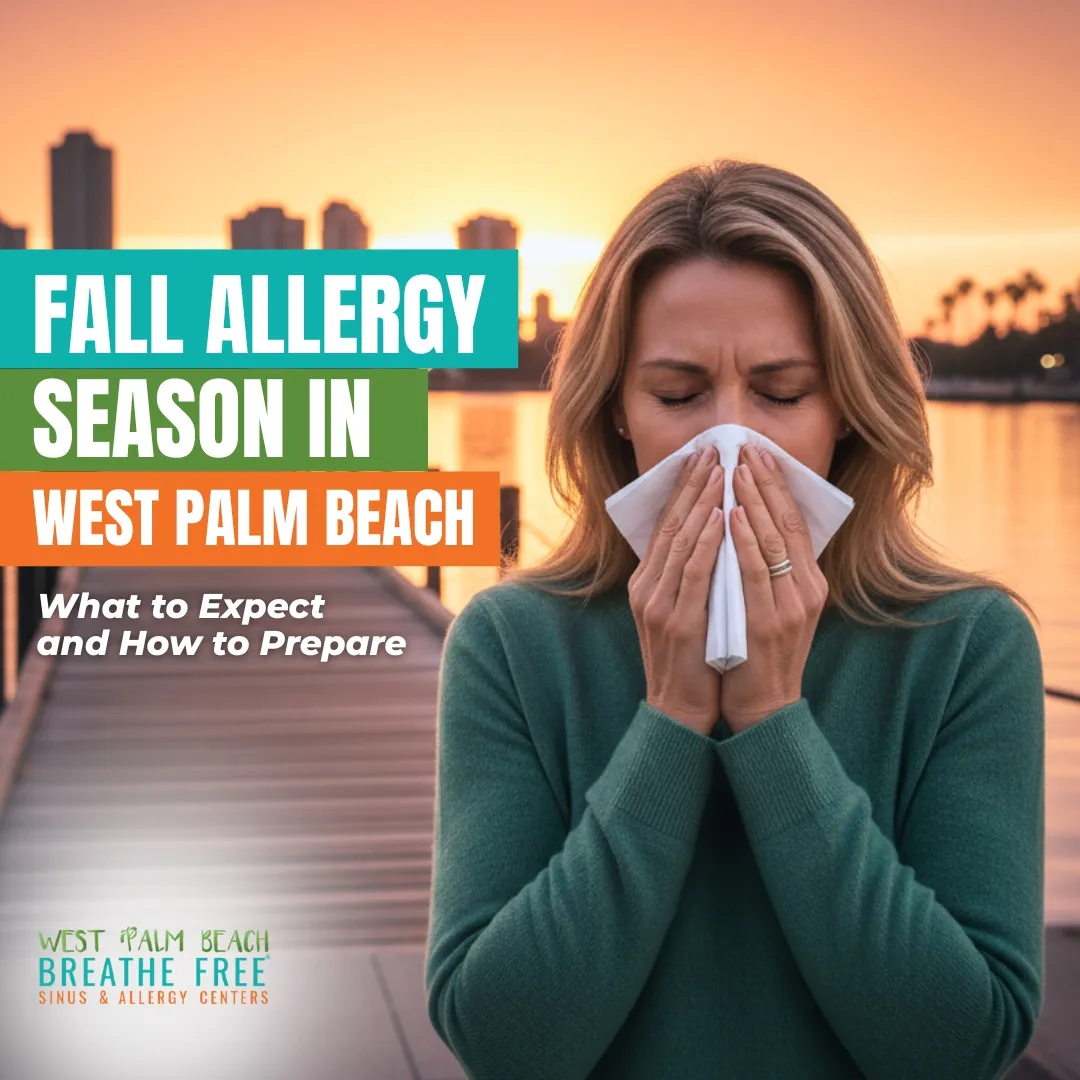.webp)
Fall Allergy Season in West Palm Beach: What to Expect and How to Prepare
West Palm Beach, Florida, is known for its year-round sunshine, coastal charm, and mild winters. But while the warm climate makes it a popular destination and a great place to live, it also creates ideal conditions for allergens to thrive — especially during the fall.
Unlike many parts of the country that enjoy an allergy break during cooler months, South Florida’s extended growing season allows pollen, mold, and other airborne allergens to remain active well into late fall and even early winter.

🍂 What Causes Fall Allergies in West Palm Beach?
Fall is considered a high-risk season for allergies across Florida, and West Palm Beach is no exception. While the temperature may be pleasant, the air is often filled with allergens that can trigger uncomfortable symptoms in sensitive individuals.
Key Fall Allergy Triggers:
- Ragweed Pollen – A leading fall allergen. Ragweed thrives in the region’s climate and releases lightweight pollen that can travel long distances in the air.
- Oak and Pine Pollen – Though often associated with spring, these trees can begin releasing pollen during the fall in Florida's extended warm season.
- Mold Spores – As leaves accumulate and decompose, mold levels rise, especially after rainfall. Mold spores become airborne and can cause significant respiratory symptoms.
- Dust Mites – These microscopic allergens flourish in humid, indoor environments — common across South Florida homes.
Because the pollination season lasts longer in Florida, many residents experience allergy symptoms into December — long after other regions have seen relief.
🤧 Common Symptoms of Fall Allergies
Allergy symptoms may vary in intensity but often include:
- Nasal congestion or stuffy nose
- Runny nose with clear discharge
- Frequent sneezing
- Itchy or watery eyes
- Postnasal drip and throat irritation
- Persistent coughing
- Headaches or facial pressure
- Fatigue or trouble sleeping
If these symptoms last for several weeks or worsen during the fall, they may be tied to environmental allergens.
🛡️ How to Prepare for Fall Allergy Season in West Palm Beach
Managing fall allergies starts with prevention. The following strategies can help reduce your exposure to allergens and support better respiratory health.
✅ Limit Your Exposure to Airborne Allergens
- Check daily pollen counts using reliable sources like Pollen.com or AccuWeather.
- Plan outdoor activities for late afternoon or evening, when pollen levels tend to drop.
- Stay indoors on high-pollen or windy days whenever possible.
- Keep windows and doors closed to prevent allergens from entering your home.
- Shower and change clothes after spending time outdoors to remove pollen from skin and hair.
- Vacuum and dust regularly, especially carpets, bedding, and curtains.
- Wash bed linens weekly in hot water.
- Use HEPA filters and air purifiers to improve indoor air quality.
- Bathe and groom pets frequently — and wipe them down after time outside to minimize pollen transfer.
✅ Support Your Immune System
- Stay hydrated to keep mucus thin and promote sinus drainage.
- Get consistent, restful sleep each night.
- Eat a nutrient-rich diet with plenty of vitamins, zinc, and antioxidants.
- Stay physically active to support immune function.
- Practice good hygiene habits, including frequent hand washing.
✅ Consider Over-the-Counter Symptom Relief
Many allergy sufferers find temporary relief with OTC medications:
- Antihistamines – Reduce sneezing, runny nose, and itching
- Decongestants – Help alleviate nasal pressure (short-term use only)
- Nasal corticosteroid sprays – Reduce inflammation and congestion
- Eye drops – Relieve itching or redness
- Pain relievers – Address sinus-related headaches or pressure
⚠️ Always consult a pharmacist or healthcare provider before starting new medications, especially if you have pre-existing conditions.
✅ Consult a Specialist for Personalized Allergy Care
If symptoms continue despite lifestyle changes or OTC medications, it may be time to seek professional care. At West Palm Beach Breathe Free Sinus & Allergy Centers, we offer:
- Comprehensive allergy testing to identify your specific triggers
- Personalized treatment plans based on your results, health history, and goals
- Sublingual immunotherapy (SLIT) — allergy drops that may help desensitize your immune system over time
Note: SLIT is not FDA-approved for all allergens and may not be appropriate for everyone. Your provider will help determine whether it’s the right option for you.
🌬️ Trusted Allergy Care in West Palm Beach and Surrounding Communities
You don’t have to let allergies control your life. If your symptoms are affecting your sleep, productivity, or quality of life, our team at West Palm Beach Breathe Free is here to help.
We proudly serve patients in West Palm Beach, Lake Worth, Palm Beach Gardens, and nearby communities with effective, evidence-based allergy and sinus care.
📅 Schedule Your Consultation
Take the first step toward long-term relief. Contact West Palm Beach Breathe Free Sinus & Allergy Centers to schedule your personalized consultation today.
The information provided in this article is for informational and educational purposes only and does not constitute medical advice. It is not intended to diagnose, treat, cure, or prevent any disease or medical condition. Always seek the guidance of your physician or other qualified healthcare provider with any questions you may have regarding a medical condition or treatment.
Results may vary: Treatment outcomes and health experiences may differ based on individual medical history, condition severity, and response to care.
Emergency Notice: If you are experiencing a medical emergency, call 911 or seek immediate medical attention.


